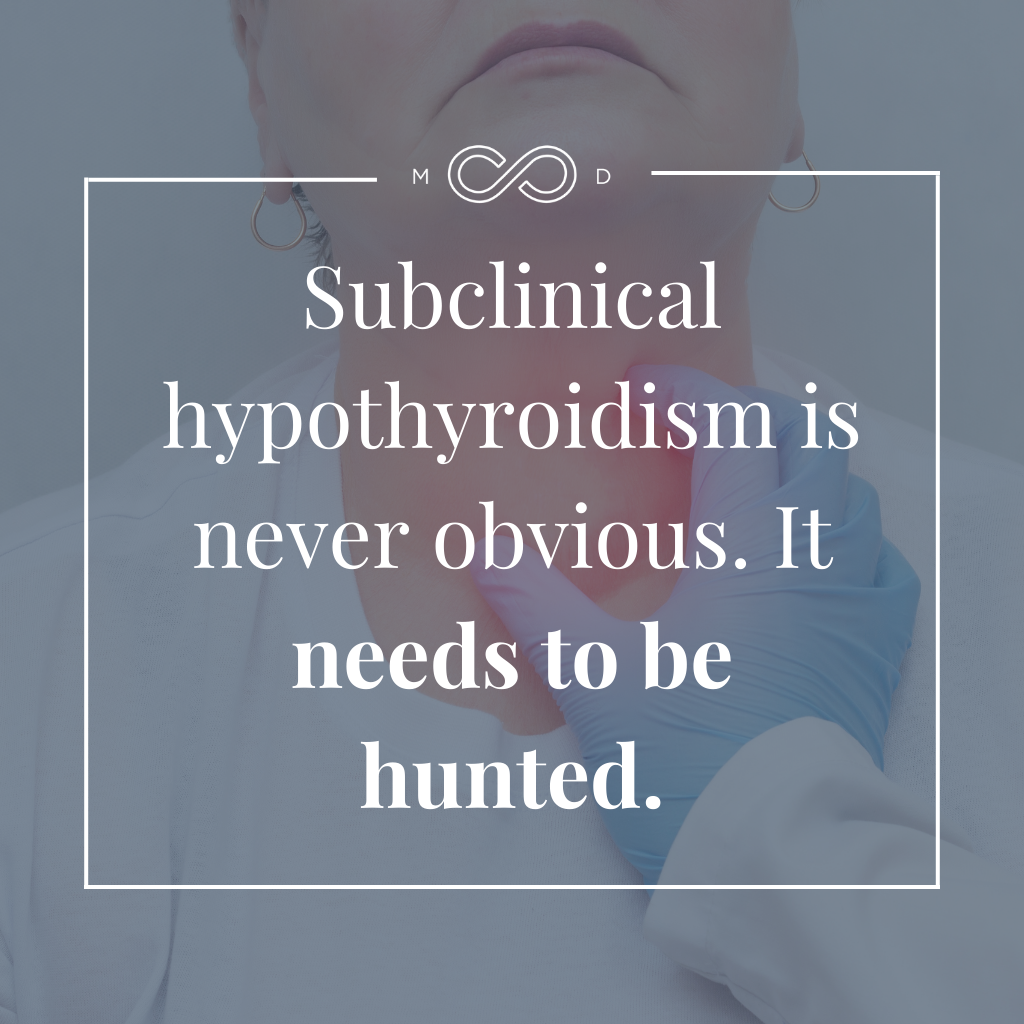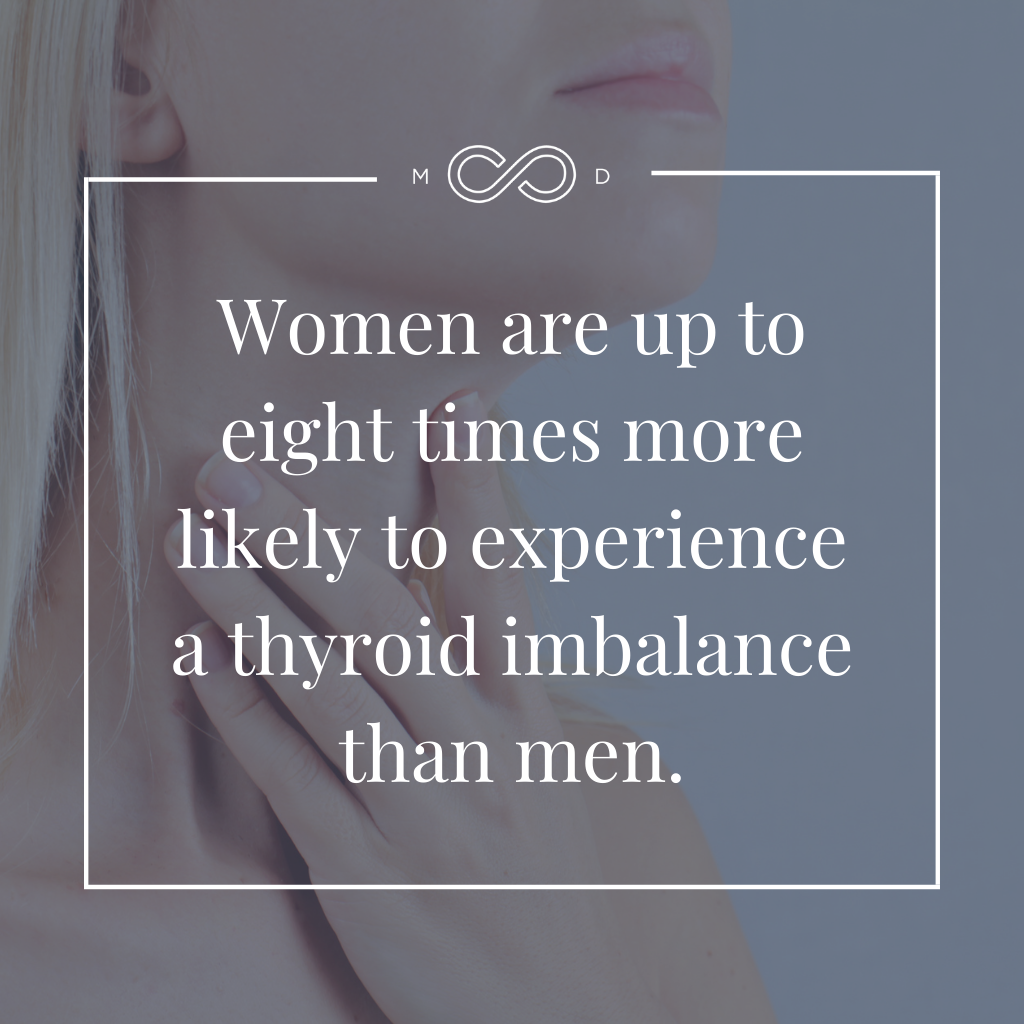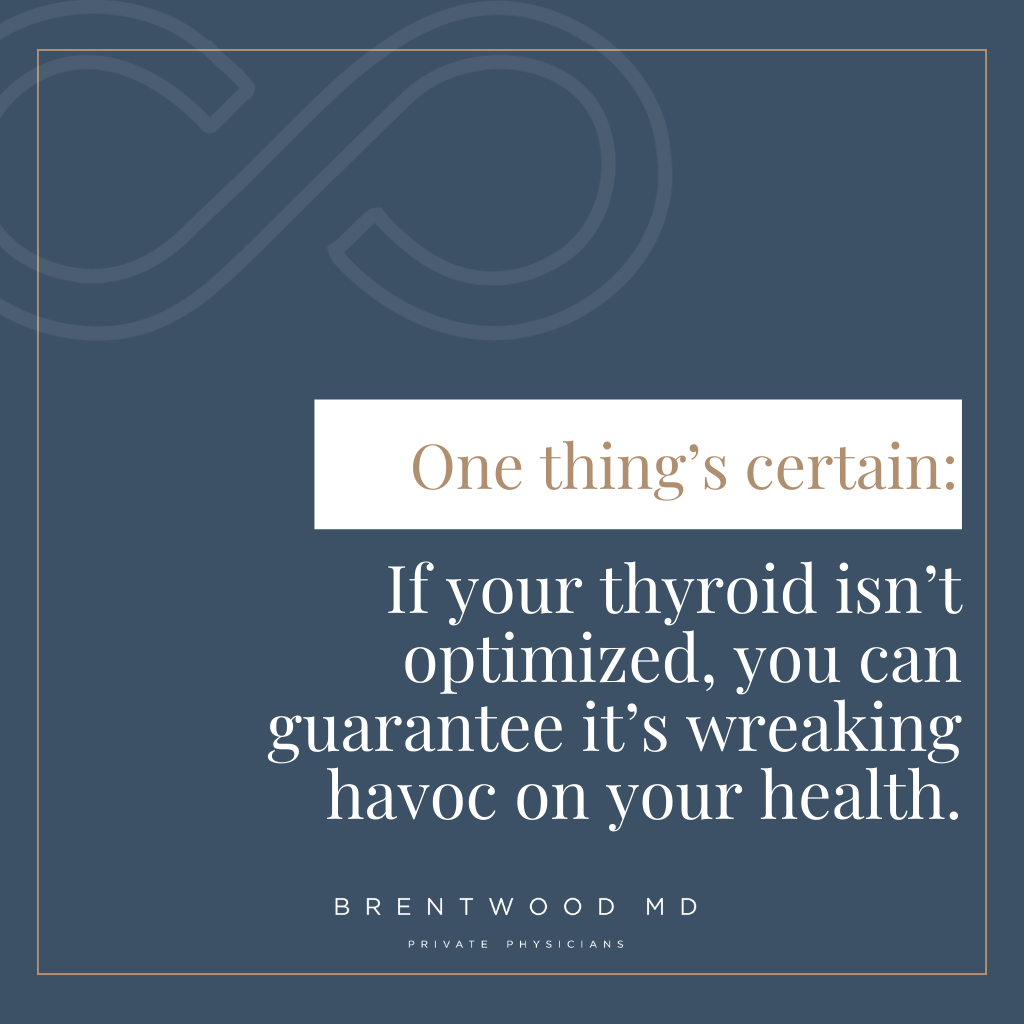You’re not just tired; you’re knock-down, drag-out exhausted.
You’re not just irritable; your moods surge in unpredictable highs and lows.
Your hair is thinning and falling out.
Your menstrual cycle and weight follow the same miserable roller coaster as your moods.
Do any of these issues sound familiar? If you’re nearing or past 40, you might be tempted to blame your symptoms on aging or perimenopause. Not so fast! The real culprit could be your thyroid.
The thyroid is one of the most misunderstood and mismanaged components of our bodies. And, unfortunately, women are up to eight times more likely to experience a thyroid imbalance than men.
Could you be one of the millions of women suffering from an undiagnosed thyroid imbalance?
If you are, it’s my goal through this conversation to help you make connections between your health issues and your thyroid. Thyroid optimization and education are passions of mine — because I simply can’t stand to see so many women today suffer with symptoms they shouldn’t have to endure.
By the end of this thyroid discussion, I want you to walk away equipped with the tools you need to advocate for your thyroid health and the knowledge you need on how to optimize your thyroid function.
The days of letting thyroid symptoms slide are over. It’s time to approach your physician and say, “Hey, let’s talk about whether my thyroid has something to do with this.”
What Is the Thyroid Gland?
You might not know much offhand about your thyroid, and I wouldn’t blame you. This complicated little organ affects, well, everything about how your body works.
The thyroid is a small, butterfly-shaped gland that sits at the base of the neck, directly in front of the esophagus. It produces some of the most biochemically active hormones in the body. Thyroid hormones are involved in dozens of physiological processes and are especially important in women, touching nearly every system in the female body.
Don’t let the thyroid’s size fool you into thinking it doesn’t matter. Just as a car needs an engine to produce its energy, your body needs its thyroid gland for similar reasons.
The thyroid is closely interconnected with the bloodstream and brain to produce and release thyroid hormones into your body. These hormones provide the energy your body needs to perform essential functions, including:
- Body temperature regulation
- Mood stabilization
- Energy production
- Metabolism support
- Iron production
- Menstrual cycle regulation
As the engine of your body, the thyroid needs fuel. Iodine, a mineral found naturally in certain foods, functions as that fuel. When you eat iodine-containing foods, your thyroid identifies that iodine in your bloodstream and extracts it to synthesize the thyroid hormones T4 and T3.
The pituitary gland in the brain works a little like a gas pedal and brake pedal alongside the thyroid “engine” and iodine “fuel,” accelerating or slowing down the production of thyroid hormones as needed.
Using thyroid-stimulating hormone (TSH), the pituitary gland tells the thyroid to produce more hormone if your body needs it and adequate fuel is present. Conversely, the pituitary can release less TSH if less thyroid hormone is required.
Signs Your Body Might Need Thyroid Optimization
As my residency director always said, thyroid disease is the great masquerader. It can present as just about any condition. But one thing’s certain: If your thyroid isn’t optimized, you can guarantee it’s wreaking havoc on your health.
Just like you don’t wake up one morning weighing 200 pounds more than you did the night before, you don’t develop a thyroid condition overnight. Your thyroid function either improves or declines gradually over time.
At Brentwood MD, we see women just about every day who are considering, debating, and thinking about their thyroid function. Many have mentioned their concerns to physicians, only to be told their levels are perfectly normal. Yet their symptoms persist!
Any of the following issues may indicate that your thyroid isn’t working the way it should:
- Weakness
- Fatigue
- Dry skin and coarse or thinning hair
- Intolerance to the cold
- Weight gain
- Constipation
- Muscle cramps
- Irregular periods
My talented partner and nurse practitioner, Jen Justus, experienced many of these issues herself, and she knows firsthand how frustrating it can be to have genuine symptoms that conventional doctors dismiss as insignificant.
“My husband would always comment, ‘Don’t forget your jacket!’ even when it was warm in the spring,” she shares. And Jen’s definitely not the only one. If you need a zipped-up parka in a 70-degree room, something’s not right.
Thyroid Levels: When Testing Falls Short
So, what would happen if you walked into a conventional primary care physician’s office and told them you feel like a walking thyroid disease commercial?
The doctor would probably run a standard thyroid panel to determine your TSH levels. If your TSH levels fall within the “normal” range, then — voila! — you don’t have thyroid dysfunction — or so your doctor has been taught. From there, they’ll disregard any possibility that your symptoms stem from thyroid dysfunction or that thyroid optimization might help.
Which is why the TSH test — on its own — is often part of the problem, not the solution.
TSH levels don’t tell the whole story, and looking at them on their own has led to widespread mismanagement of the thyroid.
This is exactly why we test all of our Brentwood MD members to assess TSH, free T4, and free T3. We never look at just one in isolation.
When we take the time to get the full picture, we have the tools not just to fight thyroid disease but also to work toward thyroid optimization. In other words, we’re aiming for better than “normal”; we’re aiming for excellent.
Jen emphasizes: “We’re looking for our best life, and we’re looking to feel the best that we possibly can.”
Why Should You Get Your Thyroid Levels Checked?
If you’re still here reading this, then you must recognize a connection between your thyroid function and your overall health or quality of life. Only by having your thyroid levels carefully checked by a knowledgeable physician can you confirm whether you’re walking around with subclinical hypothyroidism.
Subclinical hypothyroidism refers to a subtle thyroid imbalance that many doctors miss in their rush to move to the next patient or issue. Women with this condition feel very real symptoms but show “normal” thyroid hormone levels in conventional thyroid screenings.
These women — like you! — get lost in the “middle” between patients with obvious hypothyroidism or hyperthyroidism, forcing them to suffer without an official diagnosis or professional treatment. If you have subclinical hypothyroidism, your doctor might tell you it’s all in your head or stick you on antidepressants for an easy solution.
All of this is exacerbated by the fact that most patients get less than 10 minutes to visit with their primary care doctors each year. Regular doctors are under so much pressure to move quickly from patient to patient that they can’t stop to listen, carefully assess symptoms, and compare lab tests to uncover the truth.
Why Normal vs. Optimal Thyroid Function Matters
“Normal” is a dangerous word. It sounds positive: You’re just like everyone else, hooray! In reality, “normal” indicates that you merely fall within the standard margin of the average unhealthy adult. If the average adult is overweight and borderline diabetic, do you really want to stay in their lane?
No, probably not. That’s why I care so much about thyroid optimization. There’s a dramatic difference between normal thyroid function and optimal thyroid function.
“Normal” thyroid function is imperfect. It keeps you chronically operating at 70% of your best self. Sure, you can survive like that, but it’s not how you’d choose to live your life if you had another option.
There’s no single “perfect” thyroid level. Everyone is different, which is the beauty of what we do in practicing individualized care. That said, most women usually feel better with natural thyroid free T3 levels between 4 and 4.4 pg/mL.
Hair Loss
Women usually don’t experience significant hair thinning and hair loss until they hit their 50s, at which point most assume it to be the result of androgenic alopecia. Androgens are metabolic byproducts of testosterone that have a toxic effect on hair follicles.
But wait… How can we blame a woman’s hair loss on androgens when most women age 50 and older are about to hit menopause and aren’t producing hormones anymore? The “androgen-sensitive hair loss” theory goes right out the window.
It’s far more likely that suboptimal thyroid function is causing thin, brittle hair. In which case, learning how to optimize your thyroid levels may help to restore and improve the quality of your hair.
Jen speaks from experience on this subject, as she started taking Armour Thyroid (a bioidentical hormone therapy) for her underperforming thyroid. “On a personal level, my hair was very thin five years ago when I moved to Nashville. Even my stylist was like ‘Gosh, let’s try biotin! Let’s try a special shampoo!’” she shares. “Here comes Armour Thyroid, and now my hair is thicker than it’s ever been. That’s a confidence booster!”
Low Energy
If your thyroid isn’t functioning at optimal levels, your symptoms start to build on each other. Ongoing fatigue leads to irritability, which leads to symptoms of depression. You feel defeated — like you’re trying to sprint, but your body is stuck in quicksand.
We speak to people coping with these issues every day.
They’ll say, “I’m active, I work out, but I don’t have the energy. I have to force myself. I just don’t feel like I should.”
Natural thyroid optimization restores the thyroid’s ability to regulate your body’s metabolic rate, body temperature, and brain function. This helps you break through that wall of fatigue and finally feel revitalized.
Heart Disease
Most people wouldn’t imagine much connection between thyroid function and heart disease, but the research is clear. According to the Rotterdam Study, women with subclinical hypothyroidism have twice the risk of developing hardened arteries, heart attack, and stroke.
The simple act of learning how to optimize your thyroid function with bioidentical hormone therapy may literally cut your risk of heart disease in half!
So, not only does optimizing your thyroid function make you feel great by supporting your mood and energy, it also prevents a doubling of your cardiovascular disease risk profile. If that doesn’t get your attention, what will?
Take Action to Optimize Your Thyroid Function (and Your Life!)
You have two choices: Allow your “normal” thyroid function to diminish your quality of life, or learn how to optimize your thyroid function right now for a better future.
And good news! The solution is simple. You can easily take control of your thyroid and improve your health using bioidentical hormone therapy.
Bioidentical hormones like Armour Thyroid and Nature-Throid are exactly the same as the thyroid hormones your body produces. They’re compounded from natural sources in compounding pharmacies using the exact molecules and ratios found in the body.
As soon as this natural thyroid replacement works its way into your system, it helps to optimize your active thyroid and rapidly eliminate unwanted symptoms.
How to Optimize Thyroid Function: Action Steps
Here at Brentwood MD, we have hundreds of women (and some men too!) who have successfully optimized their thyroid function using Armour Thyroid or Nature-Throid. If you want to experience the same revitalization, empower yourself with these steps.
First, find a provider who’s willing to listen. You need and deserve a doctor who does more than strictly check your TSH levels and send you home. Choose a doctor who will check all the right lab levels and consider how you feel when creating your treatment plan! You’ll know you’ve found the right doctor when they encourage ongoing conversations about your progress, symptoms, and feedback.
Second, get your levels checked, specifically TSH, free T4, and free T3. These tests are simple — no fasting required! — and you can get them any time. In fact, you can go right now. Advocate for yourself and make sure your labs reflect TSH, free T4, and free T3. Once you have your results, begin a conversation with your doctor about their meaning and underlying trends.
The truth is, subclinical hypothyroidism is never obvious. It needs to be hunted. If your doctor is doing their job well, they’ll understand that hypothyroidism hides and must be found using a combination of holistic techniques.
Many doctors see 40 patients a day and don’t have time to “hunt.” Those aren’t the doctors you need. They only have time to put out major fires, so unless your thyroid is burning down your body, it’ll be overlooked.
The thyroid is such a complex topic that the conventional model of medical care simply doesn’t provide enough time to plumb its depths.
I hope this gives you a glimmer of hope and shows you that there is a real, tangible reason you feel as exhausted and defeated as you do. You have so much room to improve once you get aligned with a team that’s willing to have this conversation with you!


Dr. Aaron Wenzel is a concierge physician specializing in the care of fast-moving entrepreneurs, executives, and public figures in the Nashville, TN area. Dr. Wenzel’s diverse life experience and extensive training in family medicine, emergency care, nutrition, and hormone replacement therapies give him the unique platform to provide unmatched care for his patients.








